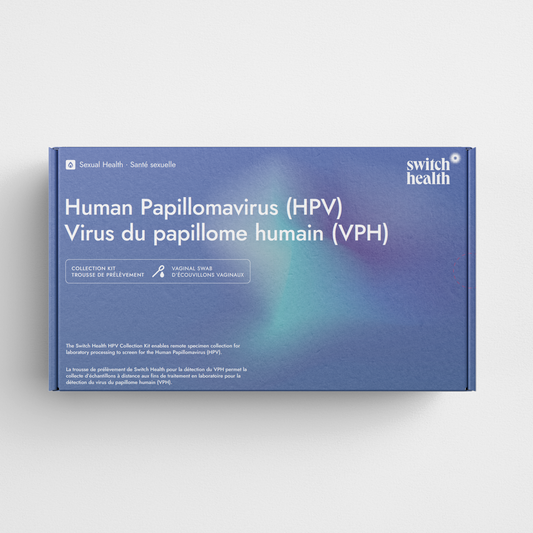THE FACTS
HPV can lead to cervical cancer, but it doesn’t have to.
At-home HPV testing can help catch HPV so you can take steps to prevent cervical cancer.
If your results are abnormal, we can set you up with tailored aftercare support with one of our trusted healthcare partners or you can download your results to bring to your own doctor -- both options are included at no extra cost with every test.
Reliable HPV testing on your terms is here
Unlike Pap smears, our HPV Collection Kit is designed for at home use and has over 90% accuracy⁵
switch health
Health Canada authorized
Official requisition issued
Test from home
Results delivered after every test
Vaginal swab (instead of cervical)
Short wait to see healthcare provider
Discreet shipping
Traditional
switch health
Traditional
Health Canada authorized
Official requisition issued
switch health
Health Canada authorized
Official requisition issued
Test from home
Results delivered after every test
Vaginal swab (instead of cervical)
Short wait to see healthcare provider
Discreet shipping
THE NUMBERS
We’re changing the face of healthcare
...and we’re just getting started.

3M
Tests completed

2M
People helped

99.98%
ASMO platform uptime
“
The HPV test kit is an innovative and convenient at home test that empowers women to test themselves when needed and protect themselves against cervical cancer.
Rona Ambrose



Questions? We’ve got answers.
All testing devices used by Switch Health are authorized by Health Canada and are validated at accredited and licensed Canadian laboratories.
Switch Health’s HPV Collection Kit is only applicable for individuals with a cervix. If you have concerns about your health, please contact a health care providers. Seeherefor more information on the cervix.
Individuals should inquire with their healthcare insurer to learn what coverage is available to them.
All results are digitally available to be downloaded in PDF format and/or printed via the Switch Health patient portal. It is the patient’s decision whether test results are shared with anyone else.
You can get a delivered anywhere Purolator and Canada Post provides service.
Results should be ready within 4-5 business days of being picked up by Purolator.
HPV is a very common virus with more than 100 strains or types. It spreads easily through sexual contact. It is estimated that 75 per cent of people will come into contact with HPV during their life. The virus usually goes away on its own without causing any problems, typically without symptoms. Sometimes symptoms may appear such as warts in the genital area that look like common skin warts.
Reference: Government of Canada. Human HPV Prevention and HPV vaccines (2017). Retrieved from https://www.canada.ca/en/public-health/services/infectious-diseases/sexual-health-sexually-transmitted-infections/hpv-prevention-vaccines-questions-answers.html
Testing for HPV is recommended for sexually active individuals over 25 years of age with a cervix.
HPV tests looks for viruses that increase the risk of developing cancer. Pap tests looks for abnormal cell changes, typically caused by HPV, on the cervix that might turn into cervical cancer.
HPV vaccines protect individuals from high-risk HPVs, but immunity is not 100% and may wane over time. It’s still worth routinely testing for HPVs.
Reference: HPV Prevention and HPV Vaccines. Government of Canada. (2017). Retrieved from https://www.canada.ca/en/public-health/services/infectious-diseases/sexual-health-sexually-transmitted-infections/hpv-prevention-vaccines-questions-answers.html
If you are Transgender, it is best to talk to your healthcare provider to determine your specific screening needs.
Reference: As a transwoman, do I need to get screening for cervical cancer (2022). Canadian Cancer Society. https://cancer.ca/en/cancer-information/find-cancer-early/screening-in-lgbtq-communities/as-a-trans-woman-do-i-need-to-get-screened-for-cervical-cancer
Talk to your healthcare provider to determine if repeating the HPV test is right for you.
While Health Canada estimates approximately 70% of sexually active men and women will have a sexually transmitted HPV infection at some point in their lives, at this time the Ontario Health Insurance Plan (OHIP) does not currently cover HPV testing.
Currently, the Ontario Health Insurance Plan (OHIP) does not cover HPV testing. Individuals should inquire with their healthcare insurer to learn what coverage is available to them.
Test results and related information are only shared with the patient. There is no requirement to report a positive test result to Public Health, nor is there any requirement to share the result with partners. It is the patient’s decision whether test results are shared with anyone else.
Individuals who take a Switch Health HPV Collection Kit must meet criteria as outlined in the HPV Product page found here.
Standard shipping is 3-9 days, expedited 1-2 days(once shipped) shipping is available for an additional $25.
If you are using pick up, store the specimen at room-temperature and place the return package in the location identified just prior to the pickup window. If you are using drop-off, hold onto the package until Sunday evening or Monday morning to keep safe until pickup service is resumed.
Fourteen HPV genotypes are considered pathogenic or high-risk for the progression of cervical Disease. Multiple studies have linked genotypes 16, 18, 31, 33, 35, 39, 45, 51, 52, 56, 58, 59, 66, and 68 to disease progression. Women with a persistent infection with one of these types have an increased risk for developing severe cervical dysplasia or cervical carcinoma.
Results will indicate individual positive or negative results for 6 genotypes including 16, 18, 31, 45, 51 and 52. The remaining 8 genotypes are reported on in the following groups: P1 including genotype 33 & 58, P2 including genotypes 56, 59 & 66 and P3 including genotypes 35, 39 and 68. No matter your result, it is strongly recommended you discuss your personal risk with a healthcare practitioner.
The HPV test can detect the risk of cervical cancer, one of the few types of cancer that can be prevented. Almost all cervical cancers, more than 99%, are associated with HPV. HPV infection doesn't mean you have cancer, but it can suggest an increased risk of it developing. Screening for HPV infection can help your healthcare provider provide the care and follow up you need.
A Pap test is looking for abnormal cervical cells from the sample and will not detect HPV.
There are many variations of HPV, but only a few can cause cancer. The body usually can protect itself against HPV infections by successfully clearing the infection resulting in no potential cell changes. However, HPV that does not clear can cause the cells in the cervix to become abnormal and potentially pre-cancerous.
If you have had a hysterectomy or pelvic surgery, it is best to speak to your healthcare provider to determine your specific screening needs.
Reference: Choosing Wisely (2019). Retrieved from https://www.choosingwisely.org/clinician-lists/asccp-paps-and-hpv-screening-after-hysterectomy/









Hear it from real people
We are creating a more accessible, patient-centric digital healthcare experience
“Our HPV Collection Kit will allow women to assess their own personal risk for cervical cancer in the privacy and comfort of home. This has the potential to not only increase the number of Canadian women getting tested, but also reduce the burden on our stretched health care systems.”
Dr. Gregory W. Taylor
Former Chief Public Health Officer of Canada Chief Medical Officer, Switch Health
Hear it from real people
We are creating a more accessible, patient-centric digital healthcare experience
“Most public screening programs in Canada test for abnormal cervical cells every three years. But cervical cancer can develop much quicker than that. Only six months before I was diagnosed, my pap smear result was normal. If you’re like me, and your body does not clear an HPV infection, you could develop cervical cancer. But routine screening combined with regular HPV testing will give women who are not able clear this virus a real chance to fight, and survive, cervical cancer.”
Liz Ellwood
Cervical Cancer Survivor